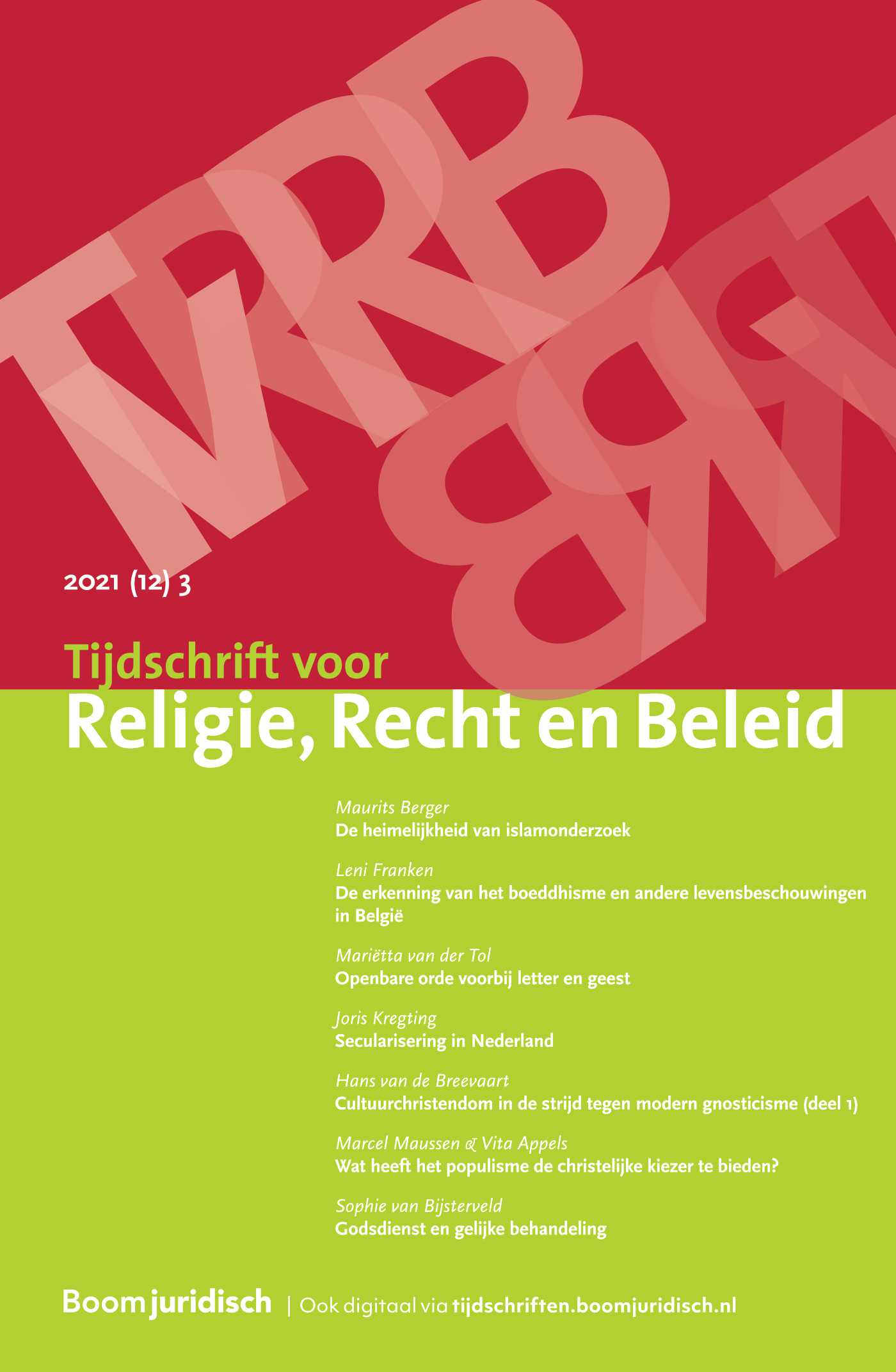|
Student requests for praying space are posing schools for important questions about their policy. These questions cannot be answered within the scope of relevant principles of law in the Netherlands. On the basis of religious studies research the author suggests that schools should respond to those questions with positive tolerance. Such a policy is most effective in promoting order and other educational objectives. However this tolerance should be bound to a responsibility of praying students towards the position of secular and moderate religious students. |


Tijdschrift voor Religie, Recht en Beleid
Meer op het gebied van Algemeen
Over dit tijdschriftMeld u zich hier aan voor de attendering op dit tijdschrift zodat u direct een mail ontvangt als er een nieuw digitaal nummer is verschenen en u de artikelen online kunt lezen.
| Diversen |
|
| Auteurs | Carla Zoethout |
| Auteursinformatie |
| Artikel |
|
| Trefwoorden | Pray, Tolerance, School, Policy, Law |
| Auteurs | Niels de Leeuw |
| SamenvattingAuteursinformatie |
| Artikel |
|
| Trefwoorden | Indonesian Muslims, migrants, citizenship, integration |
| Auteurs | Jennifer Vos en Sandra van Groningen |
| SamenvattingAuteursinformatie |
|
The policy document Integration, commitment and citizenship concludes that the Islam ‘worries parts of the Dutch society’ because of beliefs that according to them are incompatible with the democratic constitutional state. In this article we look at the relationship between Islam en citizenship from within the Indonesian Muslim community in the Netherlands. This article is based on research on positioning and self-definition of Indonesian Muslims in the Netherlands. Indonesian Muslims are in general well integrated in Dutch society. They work or study in the Netherlands and they are active in social life. Newcomers respect the pluriform and democratic legal order they already know from Indonesia. At the same time Indonesian Muslims are remarkably silent in the public debate on Islam. On the one hand this derives from their individualistic and inward interpretation of Islam, on the other hand it derives from their Indonesian national character and it partially comes from the changed political climate in the Netherlands. |
| Artikel |
|
| Auteurs | Hans Rutten |
| SamenvattingAuteursinformatie |
|
In 2011 the Dutch Parliamentarian Geert Wilders was acquitted of group defamation pursuant to article 137c of the Penal Code. The court ruled that the qualification ‘concerning a group of people because of their religion’ had not been fulfilled because Wilders had spoken about the religion of Islam but not about people. This recent juridical shortcut has various foundational problems in semantics and jurisprudence. In view of the impact that defamation of religion can have via the modern media, violent disturbance of public order should be reintroduced as a ground of liability. |
| Artikel |
|
| Auteurs | Jan Piet van Berkel |
| SamenvattingAuteursinformatie |
|
Dutch society is continually faced with conflicting interests in the context of religious expression by ethnic minorities in particular. In such instances, the constitutional freedom of religion clashes with other rights and interests, including other fundamental rights. This article provides a guideline for approaching such conflicts. It demonstrates the juridical need to seek compromise, as a means of overcoming the dilemma posed by conflicting interests. The article contains a moral call for an open mind and tolerance, as a favourable condition for achieving compromise. |
| Artikel |
|
| Trefwoorden | CSR, empirical research, religiosity, values |
| Auteurs | Corrie Mazereeuw-van der Duijn Schouten |
| SamenvattingAuteursinformatie |
|
Nowadays the interest in and valuation of Corporate Social Responsibility (CSR) is impressive, but when it comes to the effective implementation of CSR in business practices there seems to be a large gap. In order to advance CSR, it is important to know what motivates executives to contribute to CSR. Religiosity may be a motivational driver of CSR. I investigated whether religiosity influences executives’ view of and contribution to CSR. Based on empirical research conducted among 473 executives, I find that traditional religiosity leads to a philanthropic orientation towards CSR and a significant higher contribution to CSR in terms of charity. Otherwise, I find that non-traditional religiosity leads to a financial orientation towards CSR and a significant higher contribution to CSR in terms of diversity. |
| Artikel |
|
| Trefwoorden | Dutch Industrial Organisation, religious and philosophical roots |
| Auteurs | René Guldenmund |
| SamenvattingAuteursinformatie |
|
The Dutch Industrial Organisation is a public-law system of product boards and industrial boards, which are authorized to lay down general rules and impose levies on the companies under their jurisdiction. It was established in 1950 on a firm theoretical ground, where three principles coincide: the socialist principle of ‘functional decentralisation’, the protestant concept of ‘sovereignty within the communal spheres’ and the Roman Catholic concept of ‘subsidiarity’. The papal encyclical Quadragesimo Anno (1931) added greatly to the philosophical basis of this system and to the ‘collective bargaining economy’, which is so characteristic for the political culture of the Netherlands. |
| Artikel |
|
| Trefwoorden | church and state, France, history, The Netherlands |
| Auteurs | Ben Koolen |
| SamenvattingAuteursinformatie |
|
This article sketches the relationship between the churches and the State since the end of the reign of the Stadtholders (1795). The decision of the Batavian Republic to recognize independence and equal rights of each church (1796) appears to be effective not before the midst of the 19th century, under influence of liberal policy. It opened the way to co-operation between church and state, aimed at a democratic society. The churches should not be reluctant in implementing their freedom to act as free partners in the social debate. |

 Aflevering 3
Aflevering 3